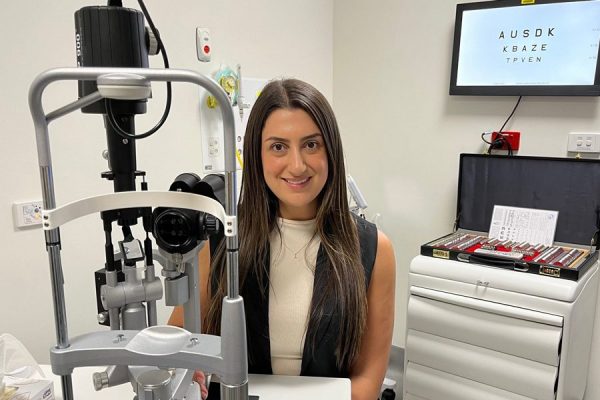Redesigning ophthalmology care at STARS

Orthoptics and Optometry Team Leader, Paula Freijah at STARS.
Metro North patients will benefit from a 12-month trial of a new referral process for cataract surgery. The STARS Public Cataract/Intraocular Lens Surgery Service will increase the number of patients eligible for the surgery, improving the lives of potentially thousands of patients across Metro North.
A cataract is a medical condition in which the lens of the eye becomes progressively opaque, resulting in blurred vision. Cataract surgery is a procedure to remove the cloudy lens of the eye, replacing it with an artificial clear lens.
There are around 250,000 cataract operations performed every year in Australia.
STARS Deputy Director of Ophthalmology, Dr Mark Loane, and Orthoptics and Optometry Team Leader, Paula Freijah, found the current referral process of only using a vision test to determine if someone was eligible for cataract surgery, led to many patients not qualifying. This was despite the significant impact that poor vision due to cataracts has on an individual’s quality of life.
“The time-honoured letter chart on a wall vision test only measures a person’s ability to see detail and high contrast, which is only one narrow aspect of visual perception,” explains Paula.
“Consequently, a patient might score adequately on a vision test but be unable to perform a lot of day-to-day tasks like driving their car, buying groceries, navigating a room or walking on uneven surfaces.
“Additionally, the referral pathway also required a patient to have a referral from both an optometrist and a GP, which placed an extra burden on the patient.”
Dr Loane, Paula and the team at STARS worked with consumers, optometrists, GPs, the surgical stream and internal stakeholders at STARS and the Royal Brisbane and Women’s Hospital, to endorse changes to the referral process at STARS, including the use of the Visual Disability Assessment (VDA) questionnaire.
“The VDA asks questions about how a person’s vision interferes with their ability to carry out 18 different activities, including driving a car by day or by night, recognising faces across the street, seeing in bright light and participating in leisure activities,” said Paula.
“By asking questions around how their vision impacts their quality of life, more patients should be eligible for cataract surgery, improving the equity of access to this important surgery.”
Patients will also only need a referral from an optometrist to access STARS Public Cataract/Intraocular Lens Surgery Service, reducing the cost and time required to obtain an additional GP referral.
As well as improving a person’s vision, cataract surgery has additional health benefits including the reduced risk of falls and fractures, increased safety and confidence, a reduction in anxiety and depression and a delayed need for a nursing home and/or carer.
